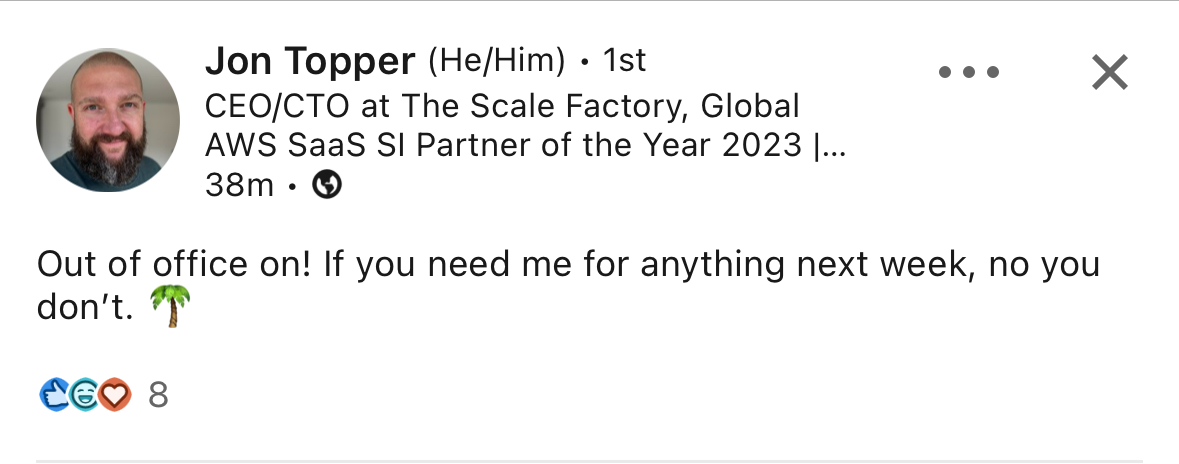Mental Health Awareness Week 2024 in the UK is taking place from 13th to 19th May. The theme this year is “Movement: Moving more for our mental health”. Sure, being active is important to get the endorphins flowing and bring a variety of wider health benefits. However, finding the time, space and energy to do that can be hard. People talk about balance in the relationship between the necessary work we all do and the rest of our lives, but what does that really look like?

Yeah, I probably had my work laptop with me. Photo by Jules Gray
Full disclosure: In the past I have been very poor at both owning and modelling what I would call a good work-life balance. My friends and family will tell you that I would routinely take a work phone and laptop to social engagements, on runs and on holiday as a precaution, a “just in case”. Of course, something would always come up, urgent or not, giving me reason to start to work. At the time I would argue it was committed and conscientious, but now I frame it as work encroaching where it ought not to be. It wasn’t a good work-life integration.
As you might expect, opinions vary on the magic formula for achieving work-life balance. In fact, a precise definition of exactly what this unicorn looks like remains hard to come by. Common threads can be found in the literature and discussions though, centred on the idea of the push and pull of demands, needs and desires in the domains of work, family and the personal. In practice, this translates to things like:
- Feeling like you have enough time and focus for friends and family
- Cultivating interests outside of your day to day work
- Good sleeping, eating and exercise habits
- Positive emotions around your current situation and the interplay between areas of your life
The converse is extreme stress, anger and frustration about where your time is spent, missing out on time with loved ones and impacts on your health and habits. Employers are becoming increasingly aware of the negative effects for them of a poor work-life balance, including failing mental health, absenteeism, lowered retention rates and a decrease in motivation and productivity.
Many companies, as we do at The Scale Factory, seek to support a good work-life balance. Here we do that through things like regular intentional one-to-one’s with line managers, access to the BUPA Employee Assistance Scheme, health insurance that covers mental health, flexible and remote working and most importantly a culture of openness that is serious about mental health.
Like sobriety and the proverbial addict, work-life balance is an active choice; a process and not a state. Do I always get it right now? No. But ultimately culture is king. The importance of a leadership and peers that recognise “our personal time, our relationships, and our lifestyles are fundamentally more important than our work” and live that daily cannot be overstated. All the policies, programs and benefits in the world are useless in the face of a culture that denies their utility and necessity.
Does The Scale Factory get that culture right? Let me answer with the words of our CEO, about to leave for a holiday:

Does this sound like something you can relate to and you feel like this might be the right environment for you? Take a moment to read more about our company values.
Remember, talking to someone is a great place to start.
SAMARITANS
Telephone (UK): 116 123
Visit: https://www.samaritans.org/how-we-can-help
MIND
Telephone (UK): 0300 123 3393
Visit: https://www.mind.org.uk/information-support/helplines/
NHS
Telephone (UK): 111
Visit: https://111.nhs.uk/guided-entry/mental-health-help
This blog is written exclusively by The Scale Factory team. We do not accept external contributions.

